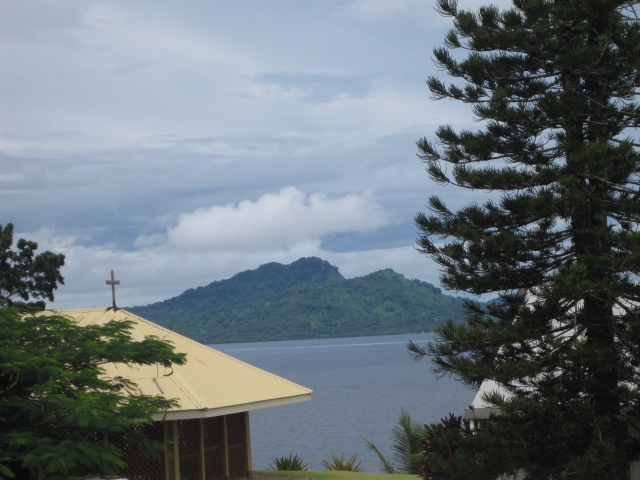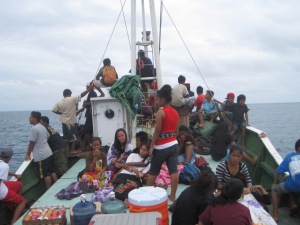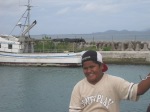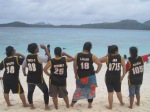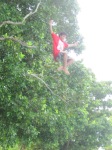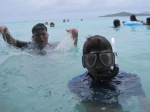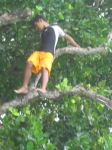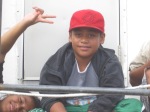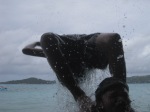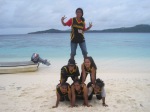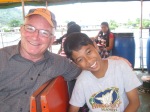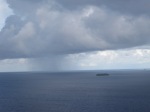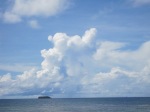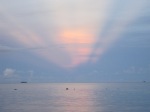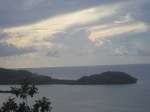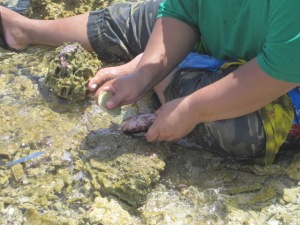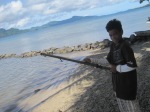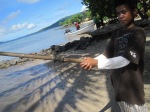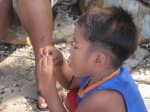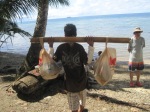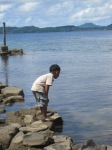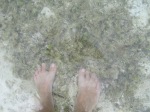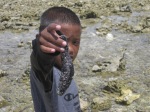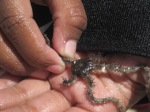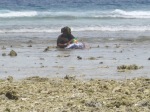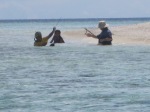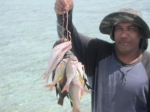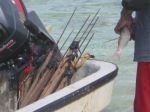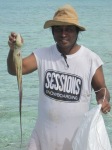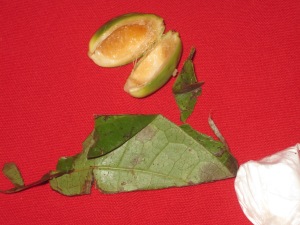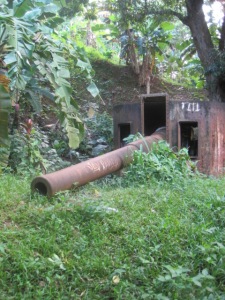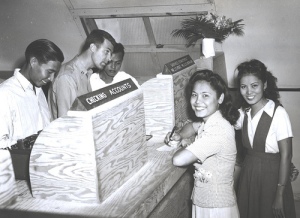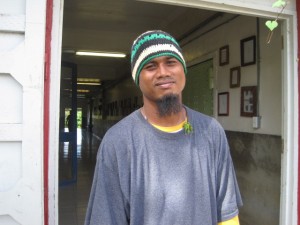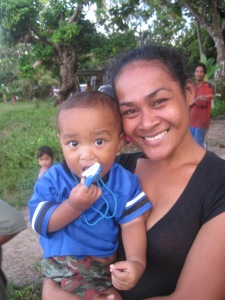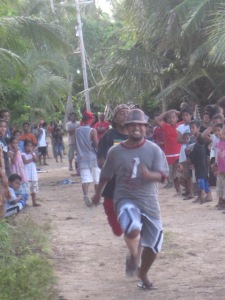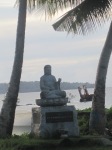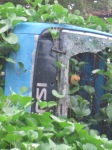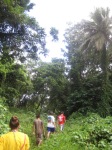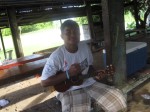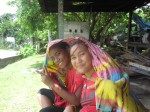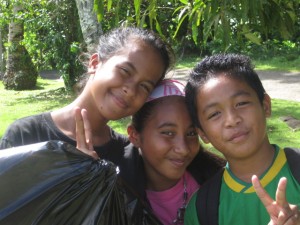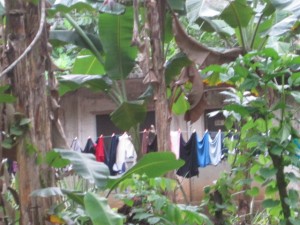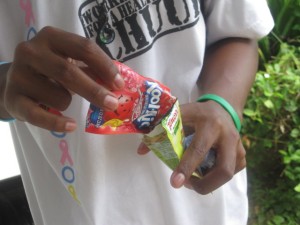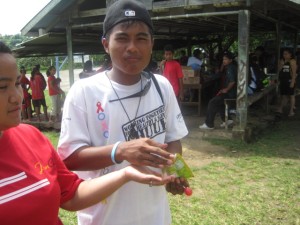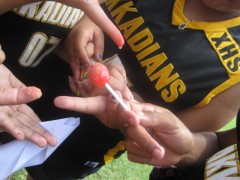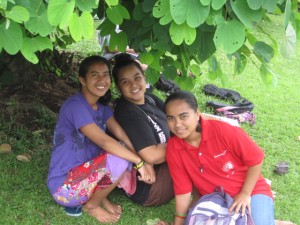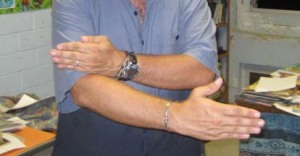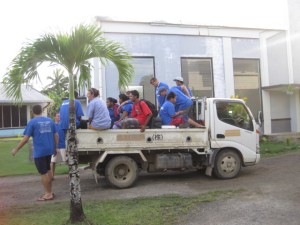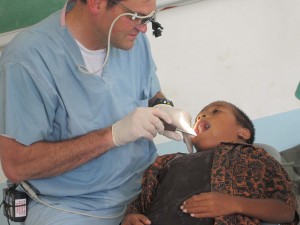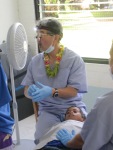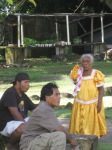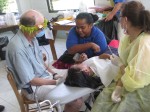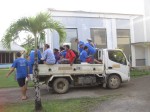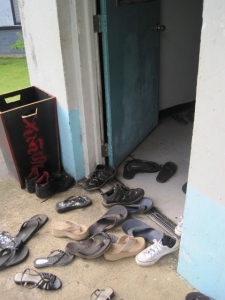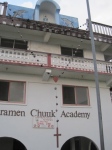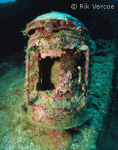What is essential is invisible to the eye. –Antoine De Saint-Exupéry
• “In seventeen years of my life, I have never travelled beyond the reef.” Wilson, one of my students shared this  with me over lunch awhile back. Never beyond the reef. In the same conversation he added, “I want to go to college in the States. Maybe Seattle or Oregon.” Never beyond the reef…and you want to go to Seattle? I can’t imagine the culture shock. Cars, skyscrapers, population density, paved roads…paved roads for godsake!!! How can someone who’s never been been beyond the reef ingest, let alone digest, Seattle? What kind of psychic hangover would he have to deal with? I know that for me, coming from the other direction– I’m still reeling, and I’m fairly well travelled and have 30 years on this kid.
with me over lunch awhile back. Never beyond the reef. In the same conversation he added, “I want to go to college in the States. Maybe Seattle or Oregon.” Never beyond the reef…and you want to go to Seattle? I can’t imagine the culture shock. Cars, skyscrapers, population density, paved roads…paved roads for godsake!!! How can someone who’s never been been beyond the reef ingest, let alone digest, Seattle? What kind of psychic hangover would he have to deal with? I know that for me, coming from the other direction– I’m still reeling, and I’m fairly well travelled and have 30 years on this kid.
Yumiko, one of my co-workers is from Chuuk, born and bred. She went to college in San Rafael, CA, and I asked her what the transition was like. “It was not too tough. My dad lived in the States, and he told me what it was like. I had also been to Hawaii…and I had seen a lot of movies. So I knew what it was like. I had an idea.” I had seen a lot of movies. ( Insert old fashioned car horn noise like in Bugs Bunny cartoons here AWWWOOOOGGGGAAAAHHH!!) But I guess having a father who had lived in the States and having been to Hawaii–that’s kind of a buffer. “It wasn’t that bad.” The Chuukese are a people of few words so getting her to share more was difficult. I would think leaving here and winding up in a major U.S. metropolitan area would be mind blowing in too many ways. I can see some kids turning in upon themselves and become introverted or even worse, others being like a kid in a candy store and winding up in a hospital with a drug overdose or alcohol poisoning. “It happens. It just depends on the kid.”
But what about coming back? Reentry has to be pretty rough. “There’s just so much stuff in the States. It’s overwhelming at first but you get used to it. Coming back was tough because I wanted things right away. Starbucks, movies, things to do. I was kind of angry all the time and mad at this place. Resentful.” She went on to add, “That’s why I decided to stay here two years before leaving for grad school. I needed to decompress and get back to my culture. I like the pace of life here and I needed get back into it.” Yumi is one of the wisest people I have met here. She leaves for Graduate school in Honolulu next month after being back on Weno for two years.
• The greatest phrase of pidgin English I’ve ever heard–When leaving my class, Regino said, “Thank you very good, Mr. Chris.”
• “Making style” refers to preparing yourself for the opposite sex or whatever sex to which you are attracted, although I have noticed a light dusting of homophobia over the general populace. This observation is based only on one quote. “There are no gay Chuukese…only Filipinos.” But anyway making style includes, but is not limited to, how you comb your hair, your dress, your attitude, your body spray, how you carry yourself. It’s the same as in the States, but there are some ways of making style that are unique to Chuuk and the Pacific Islands. My three favorite are as follows in order:
1) Flowers. Flowers in your hair, in your hat, around your neck, atop your head like a crown. Forget San Francisco. If you’re going to Chuuk, Micronesia, be sure to wear some flowers in your hair.

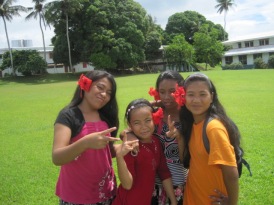 2) Gold teeth. It is the height of fashion to have several gold teeth. The more, the better. I don’t know if this is directly related to the poor state of the population’s dental health, but I have heard people say that yes, this is a factor, but there are those who just want gold teeth. When the dental clinic rolled through awhile ago, I heard one mother explaining to her child who was reluctant to get a filling not to worry it’s like getting gold teeth.
2) Gold teeth. It is the height of fashion to have several gold teeth. The more, the better. I don’t know if this is directly related to the poor state of the population’s dental health, but I have heard people say that yes, this is a factor, but there are those who just want gold teeth. When the dental clinic rolled through awhile ago, I heard one mother explaining to her child who was reluctant to get a filling not to worry it’s like getting gold teeth.
3) Coins in the ears. Not to be confused with pants on the ground phenomenon in the States a few years back, coins in the ears is definitely Chuukese. I have seen this fashion statement several times–on tweens, on teens, and on adults. One of my high school students was sporting it today. I asked her to explain. At first I thought it was because people didn’t have pockets. No, I was told. “It’s a Chuukese thing…Chuukese style…you wouldn’t understand.” ‘Dat’s how we roll at latitude 7. I’m glad I don’t get it. Because the fact that a teenager is doing something that I totally cannot relate to or understand in the slightest bit lets me know thatall is right with the universe.
• I have finally discovered Chuukese onomatopoeia–Neukamantch (noo-kah-monch). I don’t know if I spelled it  correctly; I can barely pronounce it. But I do know what it means. It can be used as an adjective or a noun. Someone can be a neukamantch, or he can just be neukamantch. In direct translation it means naughty or a naughty child. But it means a little more in that the naughtiness is distracting or has a mean tinge to it. Maybe because it sounds like homunculus, it just fits certain people. For me it has come to sound like what it is. I have had some students who are just plain neukamantch–no other word matches as perfectly–their behavior, their manner, just who they are. Say it with me—neukamantch. See what I mean?
correctly; I can barely pronounce it. But I do know what it means. It can be used as an adjective or a noun. Someone can be a neukamantch, or he can just be neukamantch. In direct translation it means naughty or a naughty child. But it means a little more in that the naughtiness is distracting or has a mean tinge to it. Maybe because it sounds like homunculus, it just fits certain people. For me it has come to sound like what it is. I have had some students who are just plain neukamantch–no other word matches as perfectly–their behavior, their manner, just who they are. Say it with me—neukamantch. See what I mean?
• I don’t know how to say this so I’ll just put it out there. I have come to the conclusion that my skin is the wrong color. As the sunburn peels off my nose and my forehead, and I look around at the people in the vast majority of the places where I have travelled, I understand white supremacists less and less–not that I ever really understood them in the first place, but dudes, there are more people who look like them than there are who look like us. And guess what, they’re better adapted the planet. Almost everyone I went to a picnic with the other day slept well that night. Why? They didn’t have to stop what they were doing every 20 minutes to reapply chemicals to their derma to stave off sunburn and eventual skin cancer and possibly untimely death. You know what? I did. You know what else? I still got sunburned. Their bed sheets didn’t feel like sandpaper– mine did. Makes you think.
color. As the sunburn peels off my nose and my forehead, and I look around at the people in the vast majority of the places where I have travelled, I understand white supremacists less and less–not that I ever really understood them in the first place, but dudes, there are more people who look like them than there are who look like us. And guess what, they’re better adapted the planet. Almost everyone I went to a picnic with the other day slept well that night. Why? They didn’t have to stop what they were doing every 20 minutes to reapply chemicals to their derma to stave off sunburn and eventual skin cancer and possibly untimely death. You know what? I did. You know what else? I still got sunburned. Their bed sheets didn’t feel like sandpaper– mine did. Makes you think.
• My favorite Chuukese expression: When you want to tell someone, “Shut up. You’re a fool. You’re embarrassing yourself and your family. Just quit whatever your’re doing…” You say, “Hang up,” and gesture like you’re hanging up a phone. This is similar to an expression popular in the Caribbean–“I done witchoo.” If you’re in the Caribbean and someone is really annoying, you say “I done witchoo…one time,” and you exaggeratedly make like you’re wiping your hands and shaking them off. In Chuuk you say, “Hang up…kebanjo (kay-pon-jō).” This translates to “Hang up… you’re bald.” Then you take your hung up hand phone and move it across your head like you’re giving yourself a buzz cut.
• The internet went down over the weekend. I walked six miles and got to a wifi so I could email my wife so she wouldn’t worry when she skyped me on Monday as planned and I didn’t pick up. As I walked back, random people driving by pulled over to give me rides some of the way back home. People do that here. I was once riding in the back of a pick up into town, and several people just hopped on board for the ride. My return walk was only a mile and a half. “It’s too hot to walk,” one driver told me. But I know he was also thinking…”You’re skin is the wrong color to be out in this sun.”
• Finally I had a long talk with some younger students today about the States and Chuukese culture–here’s the  greatest hits reel from what they told me.
greatest hits reel from what they told me.
Tell me something about Chuukese culture that I might not know.
“Girls have to respect boys. But boys don’t have to respect girls. They do respect us though because it’s just the right thing to do. We’re not allowed to swear in front of them, but they can swear in front of us. They don’t because it’s just the right thing to do. Even if a boy is younger, we need to respect him. If we walk by we need to bow or crawl past them.”
How do you feel about that?
“We don’t really think about it. It’s no big deal.” This fascinated me. As an American, I thought about how wrong this sounded. I wanted to tell them that this is nuts and they shouldn’t have to do this. Rise up, sisters! But then would I be disrespecting their culture by imposing my values on it? In our attempts to be culturally competent, I wonder how often do we impose our cultural beliefs on others?
What’s something good to eat in Chuuk?
“Breadfruit. Pounded breadfruit. You can also slice it and fry it and make breadfruit chips.”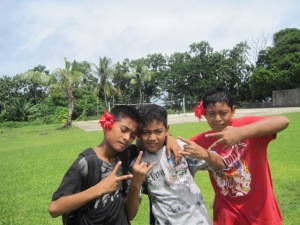
“Souka Souk. You take bananas and put them in boiling water. When the outside turns black, it’s done. Then you peel it and pound it. Then you take a coconut and get the water out of it and take the white part and squeeze the juice or oil or whatever it is on the banana. It’s messy, but it tastes so good.”
If I brought my students from the States here, how would they be different from you?
“They would dress different. Girls in the States wear shorts. We don’t. They wear tank tops too with the spaghetti straps. We don’t. It’s disrespectful to the boys.” This idea about being respectful to the boys came up a lot. I told them that I found the clothes that girls in the States wear more disrespectful to the girls. I said that I thought the way clothes were sold to them and what they were told to believe is attractive can hurt them and give them wrong ideas about what is beautiful. They didn’t see it that way. They insisted that it was more disrespectful of the boys.
What’s it like in the States?
“People are nice.”
“It’s safe there because you have traffic lights and stop signs.”
“There are big buildings and cars everywhere. You stop them when you cross the road.”
What is school like for you during the school year?
“Boring. The teachers just talk and talk. They don’t ask any questions and you don’t ask them any.”
“It’s not like here. It’s not fun. We don’t talk with our teachers.”
“I like that we get to sit around a table and talk about books here. You learn more that way. It’s not like that at my school.”
Then why, when I’m in the classroom do so few students talk or answer or even participate? It’s much different in the States?
“They are scared that their English is not good enough.”
“They don’t now how to talk in class.”
“They will say ‘yes’ a lot because it is better than saying, ‘I don’t know.’ If they say yes you won’t call on them again.”
This was also interesting. The Chuukese students are very shy in general. They do not take risks. This ran contradictory to so much of my beliefs as a teacher and, I’d have to say, as an American. You have to take risks—it’s ingrained in our character.
I held a section for more advanced students who had completed a series of differentiated reading 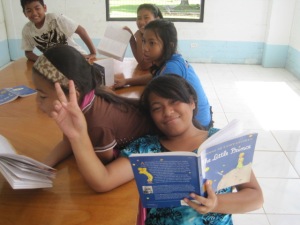 assignments and proved that they had the English reading skill to work through a novel–The Little Prince. Students were invited to join the class, which was held in addition to their regular coursework. However, admission into the section was not based on reading skill alone. The students went through a short interview with me where I told the that they would have to answer questions, ask questions and participate in discussions. A few students bowed out at this point. Others said yes that they would be willing to do this. The next step was that they had to stand on a chair, shake their fists in the air and yell, “I want to read the book!” This was not the most culturally competent screening method, and a few more students stepped out here. “I can’t do that.” Those who remained were not always the strongest readers, but the ones who were willing to take risks. As the novel unit progressed, even some of the weaker readers and shyer students came out of their shells in time, and made some interesting insights into the book. These are the students who had this conversation with me.
assignments and proved that they had the English reading skill to work through a novel–The Little Prince. Students were invited to join the class, which was held in addition to their regular coursework. However, admission into the section was not based on reading skill alone. The students went through a short interview with me where I told the that they would have to answer questions, ask questions and participate in discussions. A few students bowed out at this point. Others said yes that they would be willing to do this. The next step was that they had to stand on a chair, shake their fists in the air and yell, “I want to read the book!” This was not the most culturally competent screening method, and a few more students stepped out here. “I can’t do that.” Those who remained were not always the strongest readers, but the ones who were willing to take risks. As the novel unit progressed, even some of the weaker readers and shyer students came out of their shells in time, and made some interesting insights into the book. These are the students who had this conversation with me.
What is like to have an American teacher?
“It is good. We respect Americans.”
I wanted to get at the racial variable in this equation.
 Do you know about racism either here or in the states?
Do you know about racism either here or in the states?
“Yes. That’s when because of someone’s skin color, you think they are not strong.”
“It’s bigger in the States than in Chuuk.”
Do you think, that because I am white and come from someplace else that people might not trust me or think that I can teach them because I don’t know them or understand their culture?
“No. You’re an American, and you’re a teacher so we respect you. Some people might be scared of you even.”
“People here think that because you’re white, you’re rich” My high school students told me that if I go shopping to take one of them with me. “You’re not Chukese. They’ll think your rich and charge too much like you’re a tourist.” (See: Chasing Skirts)
The most interesting answer to the question was this: “Some kids might treat you that way but not a lot. They’re the ones who are ‘too cool for school’. They just want to show their friends that they’re not afraid of an American.”
If you could go anywhere in the world, where would you go?
“London or Rome.”
“I would like to go to Korea. My mother is Korean and my father is Chuukese. Korea is my island.” (See: It’s Just Like Crossing the Street)
“Tonoas–that’s my island.”
“New York.”
“Yale University.”
“I’d like to go to Oklahoma because it’s like London.”


 language here wasn’t so limited in its vocabulary, and if the kids had a better grasp on English, they would have a thousand different words for sand. McCaulvin (That’s his first name.) tried to explain. If you pick up the sand from over there, and mix it with the sand from here, then grab just a bit of the sand from the water–but not too deep, you could make a perfect sand ball. The sand back by the rocks under the tree is best for making sand recliners. And if you want to have a sand fight…yeah, they had a sand fight…the sand between the trees and and waterline works best if you don’t have any sand balls. Mr. Corrigan tried to put a stop to this but failed miserably. Don’t worry a local colleague told him. “These kids grow up with sand. You know how you probably used to throw snow at your friends when you were a kid? These kids don’t have snow; they have sand.” Chris? He hates the idea of getting sand in his eyes. He ran in and dunked Russell again.
language here wasn’t so limited in its vocabulary, and if the kids had a better grasp on English, they would have a thousand different words for sand. McCaulvin (That’s his first name.) tried to explain. If you pick up the sand from over there, and mix it with the sand from here, then grab just a bit of the sand from the water–but not too deep, you could make a perfect sand ball. The sand back by the rocks under the tree is best for making sand recliners. And if you want to have a sand fight…yeah, they had a sand fight…the sand between the trees and and waterline works best if you don’t have any sand balls. Mr. Corrigan tried to put a stop to this but failed miserably. Don’t worry a local colleague told him. “These kids grow up with sand. You know how you probably used to throw snow at your friends when you were a kid? These kids don’t have snow; they have sand.” Chris? He hates the idea of getting sand in his eyes. He ran in and dunked Russell again. Everything combined to make all parties happy. The kids had a blast. Chris had a blast. Even Mr. Corrigan had a blast. Although, he wasn’t convinced until the nest day–graduation day. As he watched the kids receive their certificates and awards, he didn’t necessarily see the kids who bombed his reading test, or who were still struggling to put together a coherent paragraph. He saw the child who could make beautiful (if not inappropriate) sculptures out of sand. He saw the child who sat down next to him with a plate a food saying, “Sa moga. (Let’s share food and eat.)” He saw the child who showed him where the deep water was beneath the tree in case he wanted to jump off one of the branches. He saw the kids who he was sad to be leaving behind in a few days. Chris handed him a tissue.
Everything combined to make all parties happy. The kids had a blast. Chris had a blast. Even Mr. Corrigan had a blast. Although, he wasn’t convinced until the nest day–graduation day. As he watched the kids receive their certificates and awards, he didn’t necessarily see the kids who bombed his reading test, or who were still struggling to put together a coherent paragraph. He saw the child who could make beautiful (if not inappropriate) sculptures out of sand. He saw the child who sat down next to him with a plate a food saying, “Sa moga. (Let’s share food and eat.)” He saw the child who showed him where the deep water was beneath the tree in case he wanted to jump off one of the branches. He saw the kids who he was sad to be leaving behind in a few days. Chris handed him a tissue.